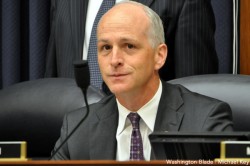National
Mixed views on ‘conscience’ language in defense bill
Some call provision ‘dangerous,’ claim it will lead to discrimination

LGBT rights supporters are expressing disappointment with “conscience” language included in the final version of major Pentagon budget legislation, and although views on its potential impact are mixed, most say the language won’t have a substantive change on current military policy.
A bipartisan group of House and Senate lawmakers made public on Tuesday their agreement for the fiscal year 2013 defense authorization bill, a $633 billion proposal that sets policy for the Pentagon, continues pay for troops and provides funding for military programs.
But these lawmakers also agreed to include a watered-down provision along the lines of an anti-gay measure included in the House bill by outgoing Rep. W. Todd Akin (R-Mo.). That provision was understood to mean service members would be allowed to harass their gay colleagues and that military chaplains could refuse to minister to them simply by saying to do so goes against their religious beliefs.
The language in the conference report, listed under Section 533, is divided into two parts: the first says service members can’t be punished for their beliefs so long as they don’t violate the Uniform Code of Military Justice, the second says chaplains can’t be punished for refusing to perform a ritual contrary to their religious beliefs.
The section isn’t as overtly anti-gay as the House language — there’s no mention of “human sexuality” or sexual orientation — and says service members can still be punished if they act or speak out on their beliefs.
Lawmakers were expected to take up the legislation by the end of this week. House Armed Services Committee Chair Buck McKeon (R-Calif.) said during the conference that he was hopeful for a vote Thursday.
Ian Thompson, legislative representative for the American Civil Liberties Union, was among those offering the strongest objections to the “conscience” language, saying passage could lead to “claims to discriminate, not only against lesbian, gay, and bisexual service members, but also against women, religious minorities, and in the provision of health care.”
“It could reopen longstanding prohibitions against harassment, could lead to claims of a right to proselytize other service members as well as civilians in occupied areas, and could lead to claims of an opt-out from providing health care or participating in anti-harassment training,” Thompson said.
One conservative group is also claiming victory. Tony Perkins, president of the anti-gay Family Research Council, expressed satisfaction over inclusion of the “conscience” language in a statement.
“We are happy to see that Congress has included language in the Department of Defense reauthorization bill that will protect the conscience rights of chaplains and service members,” Perkins said. “This language provides for the protection of the First Amendment rights of all our men and women in the Armed Forces.”
But the “conscience” provision is one small part of the defense authorization bill aimed at continuing funds for the Pentagon and paychecks for U.S. troops. Moreover, the provision was included in exchange for dropping another provision in the House bill that would have prohibited same-sex marriages on military bases.
Progressives have reason to celebrate because the final report includes a provision in the Senate bill offered by Sen. Jeanne Shaheen (D-N.H.) to expand health coverage to cover female service members seeking abortions in cases of rape and incest. Previously, the Pentagon would only provide an abortion in the event the mother’s life was in danger.
Furthermore, other LGBT advocates didn’t express the same sense that “conscience” language would have significant impact.
These advocates are echoing the sentiment of Rep. Adam Smith, top Democrat on the House Armed Services Committee, who told the Washington Blade during a news conference on Tuesday that while he personally doesn’t support the language, it won’t have a substantive impact on the military because it’s consistent with current policy.
“I think that’s current law,” Smith said. “You can’t punish someone based solely on their beliefs. It has to be actions. That’s current law. I didn’t think that this language needed to be in it. If you ask me, what the one thing I would take out of this bill, if I could, that would be the one thing I would take out of this bill. Now, it’s significantly neutered, if you will, to the point where I don’t think it’s going to be a problem, and I’m going to support the bill, but that is a provision that I did not support.”
Among the groups saying the provisions would have no effect are the Human Rights Campaign, OutServe-SLDN and the Center for American Progress.
Michael Cole-Schwartz, a Human Rights Campaign spokesperson, called the provision “unnecessary” in the wake of repeal of “Don’t Ask, Don’t Tell,” but also “meaningless.”
“While it’s bad, it’s also meaningless in a lot of ways,” Cole-Schwartz said. “We were successful in making sure an extension of DOMA wasn’t included and it’s not clear that this language, while unfortunate, will have meaningful consequence for service members.”
Allyson Robinson, executive director of OutServe-SLDN, called the inclusion of the language “disheartening” — especially because it comes on the second anniversary of “Don’t Ask, Don’t Tell” repeal — but says it won’t create any new policy for the Pentagon.
“Indeed, no service member or chaplain is ever punished for his or her religious beliefs unless he or she acts on those beliefs in a way inconsistent with military law or good order and discipline,” Robinson said.
But Robinson also said the appearance of the language in the defense bill should serve as a cautionary tale.
“The fact that provisions such as these could make their way into this bill is an indication that the gains we have made are fragile and that we must remain ever vigilant even as we look toward the work ahead of us needed to achieve full equality in our military,” Robinson said.
Crosby Burns, research associate on LGBT issues for the Center for American Progress, also shared the sentiment that nothing new would happen if the “conscience” provision became law.
“Based on the conference reports language, I believe that it essentially reiterates existing freedoms and protections that service members and chaplains already have,” Burns said. “Obviously, it sets a dangerous precedent because it’s based off language in the House bill that was intentionally crafted to allow people to discriminate against openly gay service members, so obviously that’s cause for concern, but based off the existing language, we believe it doesn’t actually change anything in terms of the substantive policy.”
The White House is staying mum on the conference report provision. A spokesperson didn’t respond to a request for comment after it was made public.
In May, the White House issued a Statement of Administration Policy saying the Obama administration “strongly objects” to the conscience language as it appeared in the House bill along with the provisions barring same-sex marriage from taking place on military bases.
Denying the passage of the provision would have no impact, ACLU’s Thompson drew on the White House objections to the House language while condemning the provision found in the conference report.
“Earlier this year, the White House conveyed its strong objections to the original House-passed language based on how the provision would affect ‘all personnel-related actions based on certain religious and moral beliefs, which, in its overbroad terms, is potentially harmful to good order and discipline,'” Thompson said. “Those serious concerns have — despite initial reports to the contrary — not been resolved by this conference report language. Rather, they are magnified.”
But the White House Statement of Administration Policy doesn’t go as far as a veto threat over the conscience provision if the final version of the bill includes this provision.
Asked whether a veto is necessary, Thompson said the ACLU has already called on Obama to veto the defense authorization bill over an unrelated provision related to detainees at Guantanamo Bay, but hasn’t yet determined whether to include the “conscience” provision as another reason to veto the bill.
“The ACLU, as part of a broad coalition of human rights organizations, is already recommending a veto of the legislation based on its Guantanamo detainee transfer prohibitions,” Thompson said. “We are exploring whether to add this provision as another reason we would recommend a White House veto.”
The complete language of Section 533 of the bill follows:
SEC. 533. PROTECTION OF RIGHTS OF CONSCIENCE OF MEMBERS OF THE ARMED FORCES AND CHAPLAINS OF SUCH MEMBERS.
(a) PROTECTION OF RIGHTS OF CONSCIENCE. —
(1) ACCOMMODATION. — The Armed Forces shall accommodate the beliefs of a member of the armed forces reflecting the conscience, moral principles, or religious beliefs of the member and, in so far as practicable, may not use such beliefs as the basis of any adverse personnel action, discrimination, or denial of promotion, schooling, training, or assignment.
(2) DISCIPLINARY OR ADMINISTRATIVE ACTION. — Nothing in paragraph (1) precludes disciplinary or administrative action for conduct that is proscribed by chapter 47 of title 10, United States Code (the Uniform Code of Military Justice), including actions and speech that threaten good order and discipline.
(b) PROTECTION OF CHAPLAIN DECISIONS RELATING TO CONSCIENCE, MORAL PRINCIPLES, OR RELIGIOUS BELIEFS. — No member of the Armed Forces may— (1) require a chaplain to perform any rite, ritual, or ceremony that is contrary to the conscience, moral principles, or religious beliefs of the chaplain; or (2) discriminate or take any adverse personnel action against a chaplain, including denial of promotion, schooling, training, or assignment, on the basis of the refusal by the chaplain to comply with a requirement prohibited by paragraph (1).
(c) REGULATIONS.—The Secretary of Defense shall issue regulations implementing the protections afforded by this section.
Federal Government
UPenn erases Lia Thomas’s records as part of settlement with White House
University agreed to ban trans women from women’s sports teams

In a settlement with the Trump-Vance administration announced on Tuesday, the University of Pennsylvania will ban transgender athletes from competing and erase swimming records set by transgender former student Lia Thomas.
The U.S. Department of Education’s Office for Civil Rights found the university in violation of Title IX, the federal rights law barring sex based discrimination in educational institutions, by “permitting males to compete in women’s intercollegiate athletics and to occupy women-only intimate facilities.”
The statement issued by University of Pennsylvania President J. Larry Jameson highlighted how the law’s interpretation was changed substantially under President Donald Trump’s second term.
“The Department of Education OCR investigated the participation of one transgender athlete on the women’s swimming team three years ago, during the 2021-2022 swim season,” he wrote. “At that time, Penn was in compliance with NCAA eligibility rules and Title IX as then interpreted.”
Jameson continued, “Penn has always followed — and continues to follow — Title IX and the applicable policy of the NCAA regarding transgender athletes. NCAA eligibility rules changed in February 2025 with Executive Orders 14168 and 14201 and Penn will continue to adhere to these new rules.”
Writing that “we acknowledge that some student-athletes were disadvantaged by these rules” in place while Thomas was allowed to compete, the university president added, “We recognize this and will apologize to those who experienced a competitive disadvantage or experienced anxiety because of the policies in effect at the time.”
“Today’s resolution agreement with UPenn is yet another example of the Trump effect in action,” Education Secretary Linda McMahon said in a statement. “Thanks to the leadership of President Trump, UPenn has agreed both to apologize for its past Title IX violations and to ensure that women’s sports are protected at the university for future generations of female athletes.”
Under former President Joe Biden, the department’s Office of Civil Rights sought to protect against anti-LGBTQ discrimination in education, bringing investigations and enforcement actions in cases where school officials might, for example, require trans students to use restrooms and facilities consistent with their birth sex or fail to respond to peer harassment over their gender identity.
Much of the legal reasoning behind the Biden-Harris administration’s positions extended from the 2020 U.S. Supreme Court case Bostock v. Clayton County, which found that sex-based discrimination includes that which is based on sexual orientation or gender identity under Title VII rules covering employment practices.
The Trump-Vance administration last week put the state of California on notice that its trans athlete policies were, or once were, in violation of Title IX, which comes amid the ongoing battle with Maine over the same issue.
New York
Two teens shot steps from Stonewall Inn after NYC Pride parade
One of the victims remains in critical condition

On Sunday night, following the annual NYC Pride March, two girls were shot in Sheridan Square, feet away from the historic Stonewall Inn.
According to an NYPD report, the two girls, aged 16 and 17, were shot around 10:15 p.m. as Pride festivities began to wind down. The 16-year-old was struck in the head and, according to police sources, is said to be in critical condition, while the 17-year-old was said to be in stable condition.
The Washington Blade confirmed with the NYPD the details from the police reports and learned no arrests had been made as of noon Monday.
The shooting took place in the Greenwich Village neighborhood of Manhattan, mere feet away from the most famous gay bar in the city — if not the world — the Stonewall Inn. Earlier that day, hundreds of thousands of people marched down Christopher Street to celebrate 55 years of LGBTQ people standing up for their rights.
In June 1969, after police raided the Stonewall Inn, members of the LGBTQ community pushed back, sparking what became known as the Stonewall riots. Over the course of two days, LGBTQ New Yorkers protested the discriminatory policing of queer spaces across the city and mobilized to speak out — and throw bottles if need be — at officers attempting to suppress their existence.
The following year, LGBTQ people returned to the Stonewall Inn and marched through the same streets where queer New Yorkers had been arrested, marking the first “Gay Pride March” in history and declaring that LGBTQ people were not going anywhere.
New York State Assemblywoman Deborah Glick, whose district includes Greenwich Village, took to social media to comment on the shooting.
“After decades of peaceful Pride celebrations — this year gun fire and two people shot near the Stonewall Inn is a reminder that gun violence is everywhere,” the lesbian lawmaker said on X. “Guns are a problem despite the NRA BS.”
New York
Zohran Mamdani participates in NYC Pride parade
Mayoral candidate has detailed LGBTQ rights platform

Zohran Mamdani, the candidate for mayor of New York City who pulled a surprise victory in the primary contest last week, walked in the city’s Pride parade on Sunday.
The Democratic Socialist and New York State Assembly member published photos on social media with New York Attorney General Letitia James, telling followers it was “a joy to march in NYC Pride with the people’s champ” and to “see so many friends on this gorgeous day.”
“Happy Pride NYC,” he wrote, adding a rainbow emoji.
Mamdani’s platform includes a detailed plan for LGBTQ people who “across the United States are facing an increasingly hostile political environment.”
His campaign website explains: “New York City must be a refuge for LGBTQIA+ people, but private institutions in our own city have already started capitulating to Trump’s assault on trans rights.
“Meanwhile, the cost of living crisis confronting working class people across the city hits the LGBTQIA+ community particularly hard, with higher rates of unemployment and homelessness than the rest of the city.”
“The Mamdani administration will protect LGBTQIA+ New Yorkers by expanding and protecting gender-affirming care citywide, making NYC an LGBTQIA+ sanctuary city, and creating the Office of LGBTQIA+ Affairs.”






















